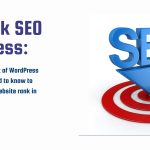Unlock Growth: Why Switching from Wix to WordPress Is a Game-Changer for Your Business
Are you feeling like your website is holding you back from reaching your full potential? If you’re currently using Wix and dreaming of a more powerful online presence, it’s time to reconsider your tools. Welcome to “Unlock Growth: Why Switching from Wix to WordPress Is a Game-Changer for Your Business.” In this post, we’ll explore how making the leap to WordPress can transform not just your website, but also the trajectory of your business. From enhanced flexibility and customization options to robust SEO capabilities and scalability that grows with you, discover why countless entrepreneurs are switching gears—and how you can join them on the path to success!
Introduction: The Importance of a Strong Online Presence for Businesses
In today’s digital landscape, having a strong online presence is no longer just an option; it’s a necessity for businesses of all sizes. Your website serves as your virtual storefront, and first impressions matter. Whether you’re a budding entrepreneur or an established brand, the platform you choose can significantly impact your growth trajectory.
As the competition heats up, many business owners are reevaluating their choices when it comes to website builders. One common question arises: should I stick with Wix or make the leap to WordPress? This decision could be pivotal for achieving long-term success and unlocking new growth opportunities.
If you’re feeling restricted by your current setup on Wix and curious about what WordPress has to offer, this article will guide you through why switching from Wix to WordPress may just be the game-changer you’ve been looking for in your journey toward business excellence.
What is Wix and WordPress?
Wix and WordPress are two popular platforms for building websites, each catering to different needs.
Wix is a user-friendly website builder that allows users to create sites using drag-and-drop features. It’s ideal for beginners who want a straightforward approach without needing coding skills. With preset templates and design layouts, Wix enables quick setup but can limit creativity as you grow.
On the other hand, WordPress is an open-source content management system (CMS). It offers immense flexibility and control over your site’s design and functionality. Users can choose from thousands of themes and plugins, allowing them to tailor their website precisely according to their business requirements.
Both platforms serve distinct purposes; understanding their differences is key in choosing the right one for your online journey.
Limitations of Wix for Business Growth
Wix might seem appealing for beginners, but it has significant limitations for serious business growth. One major drawback is the lack of control and ownership over your website. You’re essentially renting space on their platform, which can lead to complications down the road.
Customization options are also limited. While there are templates available, they often require compromises in design and functionality. This restriction can stifle creativity and branding efforts.
Moreover, when it comes to search engine optimization (SEO), Wix struggles to compete with more robust platforms like WordPress. The built-in tools may not provide enough depth for businesses aiming to enhance their online visibility effectively.
These constraints can hinder your ability to scale and adapt as your business evolves. If you envision long-term success, relying solely on Wix could hold you back from reaching your full potential.
– Lack of control and ownership
When using Wix, many business owners quickly realize they don’t have full control over their website. You’re essentially renting space on a platform owned by another company. This means any changes made to their terms of service can impact your site without warning.
Ownership is also an issue. Your content and design choices are limited to what Wix allows. If the platform decides to shut down or change drastically, you might lose everything you’ve built.
This lack of autonomy can stifle creativity and growth. You want a platform that empowers you, not one that restricts your vision for success. Investing in a system where you own every aspect gives peace of mind and fosters innovation in how you present your brand online.
– Limited customization options
Wix offers a variety of templates. However, these designs come with restrictions. Users often find themselves limited in how they can modify layouts or features.
Customization is essential for building a unique brand identity. When businesses cannot tailor their site fully, they risk blending into the crowd. A generic website may fail to captivate potential customers.
With Wix, adding specific functionalities can be challenging. The platform’s built-in tools might not meet all business needs, leading to frustration and missed opportunities.
Business growth demands flexibility and adaptability in design choices. Unfortunately, those limitations on Wix can hinder innovation and creativity during critical scaling moments.
– Search engine optimization (SEO) challenges
Wix offers a user-friendly platform, but it comes with significant SEO challenges. Many business owners quickly realize that the built-in tools are limited. You can’t optimize your site as thoroughly as needed for better rankings.
The lack of control over URL structures is another hurdle. Customizing URLs is crucial for effective search engine indexing. Wix doesn’t provide the flexibility that savvy marketers often require.
Moreover, while Wix does provide some basic SEO features, they’re not enough to compete effectively in saturated markets. Advanced techniques like schema markup or managing redirects aren’t easily implemented.
Lastly, loading speeds can affect your site’s performance on search engines. With Wix’s templates and hosting constraints, you might find yourself at a disadvantage when trying to improve page speed metrics vital for good SEO practices.
Benefits of Using WordPress for Business Growth
WordPress empowers businesses with complete control and ownership of their websites. This freedom allows you to tailor every aspect, from layout to functionality.
Customization is where WordPress truly shines. With thousands of themes and plugins at your disposal, creating a unique online presence becomes effortless. You can adapt your site to meet specific business needs without constraints.
SEO potential is another significant advantage. WordPress offers advanced features that enhance search engine visibility. Optimizing content for better rankings is straightforward with built-in tools and plugins designed specifically for this purpose.
Furthermore, the platform’s active community ensures continuous updates and support. You’ll benefit from regular security patches, feature enhancements, and user-generated knowledge sharing.
With these powerful attributes, transitioning to WordPress positions your business for sustained growth in a competitive digital landscape.
– Full control and ownership over website
When you switch from Wix to WordPress, you gain complete control over your website. This level of ownership means you can make changes whenever necessary without restrictions.
With WordPress, you’re not confined to preset templates or features. You have the flexibility to tweak every aspect of your site according to your business needs and branding. Want a unique layout? Go for it!
Additionally, having full ownership means improved security. You’re in charge of updates and backups, ensuring that your data remains safe and accessible at all times.
The ability to install custom plugins gives you additional functionalities tailored specifically for your audience. Whether it’s an e-commerce solution or a contact form, the options are virtually limitless.
Empowering yourself with this kind of control fosters innovation and adaptability as your business evolves over time. Your website becomes a true reflection of your vision.
– Highly customizable with thousands of themes and plugins
One of the standout features of WordPress is its incredible level of customization. With thousands of themes available, you can find a design that truly reflects your brand’s identity. Whether you prefer sleek and modern or classic and traditional, there’s something for everyone.
Plugins extend the functionality of your site beyond basic needs. From e-commerce solutions to social media integration, these tools allow you to tailor your website according to your specific business goals.
You’re not limited by rigid templates or pre-set layouts; instead, you have the freedom to craft a user experience that resonates with your audience. This flexibility ensures that as your business evolves, so does your website.
The ability to tweak every aspect—from colors and fonts to functionality—means you’re always just a few clicks away from making impactful changes without needing extensive coding knowledge.
– Better SEO potential for improved online visibility
When it comes to online visibility, SEO plays a pivotal role. WordPress shines in this area with its robust capabilities.
With built-in features and plugins like Yoast SEO, you can optimize your content easily. This means better keyword integration, improved metadata management, and more control over how your site appears on search engines.
The platform also emphasizes clean code and fast loading speeds—two critical factors for ranking well on Google. A faster website leads to lower bounce rates and higher engagement.
Furthermore, WordPress allows for easy mobile optimization. Given that a significant portion of web traffic comes from mobile devices, having a responsive design is essential for capturing that audience.
In short, the enhanced SEO potential of WordPress empowers businesses to reach broader audiences effectively.
Step-by-step Guide to Migrating from Wix to WordPress
Migrating from Wix to WordPress might seem daunting, but it can be straightforward with the right approach. Start by selecting a reliable hosting provider. Look for one that offers excellent support and performance.
Next, choose your domain name if you haven’t done so already. Make sure it reflects your brand and is easy to remember.
Once that’s set, export your content from Wix using its built-in tools. This will allow you to download all essential data like text and images.
Then, move on to importing this content into your new WordPress site. The platform has user-friendly import options that make this step simple.
Afterward, play around with customizing your website design. Choose themes that resonate with your business identity and install necessary plugins for added functionality.
Take time to ensure everything looks perfect before launching!
– Choosing a hosting provider and domain name
Selecting a hosting provider is crucial when migrating from Wix to WordPress. Look for one that offers reliability, speed, and excellent customer support. Your website’s performance depends heavily on your host.
Consider factors such as uptime guarantees and server location. A local host can enhance loading speeds for nearby audiences. Research user reviews to gauge satisfaction levels before making a decision.
Next comes the domain name—a vital part of your brand identity. Choose something memorable that reflects your business ethos. Avoid overly complex names; simplicity is key.
Check availability across various platforms to ensure consistency in branding. Aim for a .com extension if possible, as it’s widely recognized and trusted by users.
Taking time with these choices will set the foundation for your new WordPress website’s success—one step closer to unlocking growth potential.
– Exporting content from Wix
Exporting content from Wix can seem daunting, but it’s a straightforward process. Start by logging into your Wix account and navigating to the dashboard. From there, you’ll want to head over to the “Site” tab.
Look for the option labeled “Manage Site.” Here, you can find tools that help with exporting data. While Wix doesn’t offer a direct export feature for all site content, you can manually copy text and download images used on your pages.
For blog posts, consider copying each post individually or using third-party applications designed specifically for this task. If you’re managing a larger website, investing some time in finding an automated solution might save you effort down the line.
Once you’ve gathered everything, keep it organized in folders on your computer so it’s easy to find when you’re ready to import into WordPress. This careful preparation will smooth out the transition significantly.
– Importing content into WordPress
Once you have exported your content from Wix, it’s time to bring it into WordPress. Start by logging into your new WordPress dashboard.
Navigate to the ‘Tools’ section and select ‘Import.’ Here, you’ll find various options tailored for different platforms. Choose the one that corresponds to your needs.
You may need a specific plugin for importing content from Wix if you’re not using standard formats like XML or CSV. Don’t worry; installing plugins is straightforward—just search, click install, then activate.
After setting everything up, upload the file containing your Wix content. WordPress will guide you through associating authors and defining other settings during this process.
Make sure all images and media are transferred as well; otherwise, they might appear broken or missing on your site. Once imported successfully, review each page and post for formatting adjustments before moving forward with customization.
– Customizing your website design
Customizing your website design on WordPress is where the real magic happens. You have a vast array of themes to choose from, each catering to different industries and aesthetics. This flexibility allows you to create a unique look that resonates with your brand.
Beyond themes, plugins offer additional layers of customization. Want to add galleries, sliders, or contact forms? There’s probably a plugin for that. These tools make it easy for anyone, regardless of technical skill.
Colors, fonts, and layouts can be tailored precisely to reflect your vision. The drag-and-drop functionality in many page builders simplifies this process even further.
With WordPress, every element can be adjusted until it feels just right. Your website will not only stand out but also provide an engaging user experience that keeps visitors coming back for more.
Success Stories:
Many businesses have transformed their online presence by switching from Wix to WordPress. Take, for example, the story of a local bakery that initially used Wix to set up its website. While it served basic needs, they struggled with customization and SEO. After migrating to WordPress, they unlocked new features and tools that allowed them to showcase their products beautifully. Their improved site not only attracted more visitors but also boosted sales significantly.
Another notable case is an e-commerce store that found itself limited by Wix’s capabilities. The owner made the switch to WordPress and was able to integrate robust plugins tailored for online selling. This move led to a smoother checkout process and better user experience overall, contributing to increased customer satisfaction and return visits.
These examples highlight how moving from Wix to WordPress can be more than just a technical upgrade; it’s often a strategic decision that propels business growth forward in ways previously thought unattainable. With full control over design choices, enhanced SEO potential, and endless customization options available through themes and plugins, businesses are finding themselves better positioned for success in the ever-evolving digital landscape.
If you’re considering this transition yourself or are curious about what’s possible when you make the switch from Wix to WordPress, remember these stories as motivation—the possibilities are truly limitless.
Conclusion
In today’s fast-paced digital world, it is crucial for businesses to have a strong online presence. While Wix may seem like an easy and convenient option, switching to WordPress can truly unlock growth for your business. With its customizable design options, powerful plugins, and SEO-friendly features, WordPress offers endless possibilities for your website. Don’t let the limitations of Wix hold back your business’s potential – make the switch to WordPress and see how it can take your online presence to the next level.




